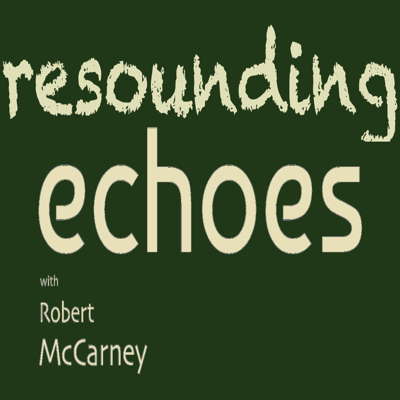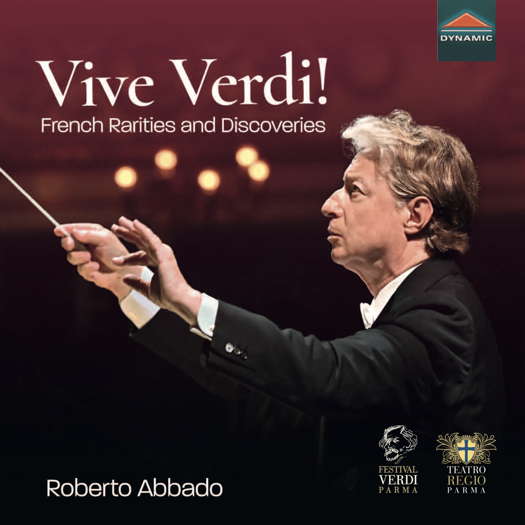 RESOUNDING ECHOES: Beginning in 2022, Robert McCarney's occasional series features little-known twentieth century classical composers.
RESOUNDING ECHOES: Beginning in 2022, Robert McCarney's occasional series features little-known twentieth century classical composers.

Rarities and Discoveries
GERALD FENECH listens to some unusual Verdi
'A memorable programme, passionately performed and splendidly recorded ...'
Undoubtedly, Italy's greatest opera composer of all time must be Giuseppe Verdi (1813-1901). He wrote twenty-seven operas and, although some early ones have never commanded a regular place in the world's opera houses, the pieces he composed during his middle and late periods (1851-1893) are among the most popular stage-works ever written. Who has not attended performances of Rigoletto, La traviata, Aida etc, some time or another during one's lifetime?
This hugely interesting issue focuses on two works Verdi composed before 1851: Nabucco (1842) and Macbeth (1847) and one of the perennial favourites, Il Trovatore (1853). Verdi's first opera, Oberto (1839,) was a success, but his second, Un Giorno di Regno (1840), was a dismal failure, and the composer vowed never to write another. But fate decreed otherwise.
After a chance meeting with Bartolomeo Merelli, the La Scala impresario, the latter gave Verdi a copy of Temistocle Solera's libretto Nabucco, previously refused by Otto Nicolai. Verdi describes how he took it home and threw it on the table with an almost violent gesture. In falling, it opened at a particular page where the composer perceived a very special line: 'Va pensiero ...' During that night Verdi could not resist reading the whole libretto, and by dawn he had done just that. Indeed, he had read Solera's libretto three times over, or so the story goes, but the composer still refused to compose the music, taking the manuscript back to Merelli the next day. Merelli, a stubborn and persuasive man, refused to accede to Verdi's decision, and stuffed the papers back into Verdi's pocket. The composer, with his tails between his legs, just had to give in, and so he did.
Bit by bit the opera started taking shape, and on 9 March 1842 it made its premiere at La Scala. The story of a King who made himself God, interwoven with a plot where love, intrigue and rebellion are brilliantly mixed, took Italy by storm. Soon it was being performed all over Europe and even elsewhere. Indeed, Nabucco was Verdi's explosion on the opera scene, which he was to dominate for the next fifty years.
Listen — Verdi: Divertissement (Nabuchodonosor Act III Scene 1)
(CDS7941 track 2, 0:00-0:54) ℗ 2022 Dynamic Srl :
Influenced by his friendship in the 1840s with Andrea Maffei, a poet and man of letters, Verdi, after receiving a commission from Florence's Teatro della Pergola, decided to compose an opera on Shakespeare's play Macbeth. He started working on this project in September 1846, encouraged by the availability of a particular singer, the baritone Felice Varesi, who would eventually sing the title role. The text by Francesco Maria Piave was based on a prose translation by Carlo Rusconi that had been published in Turin in 1838. Indeed, Verdi did not encounter Shakespeare's original work until after the premiere of his opera. Writing to Piave, Verdi made it clear how important this subject was to him, and things, as expected, did not go smoothly between the two. Still, in spite of disagreements and Verdi's need to constantly bully Piave into correcting his drafts, their version follows Shakespeare's play quite closely, apart from some minor changes.
Macbeth made its premiere on 14 March 1847 and the performance was a big success. Indeed, the opera was performed all over Italy, and during that year alone it was staged in twenty-one locations. Verdi presented his French version of the work in Paris in 1865, which was followed by only thirteen other performances, and the opera generally fell from popularity. Until after the Second World War, Macbeth was rarely performed. Today, Verdi's Macbeth is a regular item in theatres the world over.
Listen — Verdi: Ô patrie ! Ô noble terre (Macbeth Act IV)
(CDS7941 track 6, 4:28-5:22) ℗ 2022 Dynamic Srl :
Il Trovatore is a four-act opera to a libretto by Salvatore Cammarano and it is based on Antonio Garcia Gutierrez's play titled El Trovatore. One of Verdi's most enduring hits, the piece had a somewhat turbulent history before it saw the light of day. In 1844 the composer was living with Giuseppina Strepponi in Busseto. Strepponi had translated Gutierrez's play and this played a huge role in the creation of the work. In 1850, Verdi chose Cammarano, an established operatic poet, to develop a libretto, despite not having been particularly commissioned to write an opera by an established theatre. Cammarano strictly followed conventional values, and this frustrated Verdi no end. In this piece the composer wanted to explore new boundaries, to which the librettist objected multiple times. This led to an extremely strained collaboration that induced Verdi to continually push Cammarano to go beyond the normal standards, in spite of his appreciating the quality of the verse.
Il Trovatore faced further uncertainty when Verdi refused to have his opera staged in Naples. The project was further held back after the composer became busy with family issues. Living with a woman outside wedlock was certainly not the ideal situation, and despite his popularity as a composer, Verdi was frowned upon as a society scandal. Both Venice and Rome knocked on the door, but it was with the latter that Verdi finally reached an agreement. Work on the opera started in 1852 after a long delay, then tragedy struck. Cammarano died suddenly in July of that year, and Verdi had to turn elsewhere to try and finish the project. With the help of a young prodigy, Leone Emanuele Bardare, the opera at last was ready for production, and the premiere on 19 January 1853 was a colossal success. Indeed, up to this day, Il Trovatore remains one of the most performed operas in theatres all over the world.
Listen — Verdi: Galop (Le Trouvère Act III Scene 1)
(CDS7941 track 7, 24:11-25:00) ℗ 2022 Dynamic Srl :
One may ask, if these Verdi masterpieces are 'made in Italy', why is the title of the disc Vive Verdi!? Well, the answer is simple. All three works were such huge successes that Verdi was obliged to write a 'French version' for each opera for foreign performances in Brussels (Nabucco) and Paris (Macbeth and Il Trovatore). Apart from the language, Verdi also included a substantial amount of revised and new music, including ballet, and this issue is dedicated to the rarities and discoveries found in these French versions. Indeed, the 'Nabucco Divertissement' has only very recently been rediscovered. If you believe you know your Verdi, think again. A memorable programme, passionately performed and splendidly recorded, that widens our knowledge of the great Italian master.
Copyright © 22 December 2022
Gerald Fenech,
Gzira, Malta

ARTICLES ABOUT VERDI'S 'MACBETH'
ARTICLES ABOUT VERDI'S 'NABUCCO'



